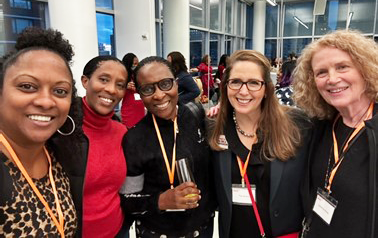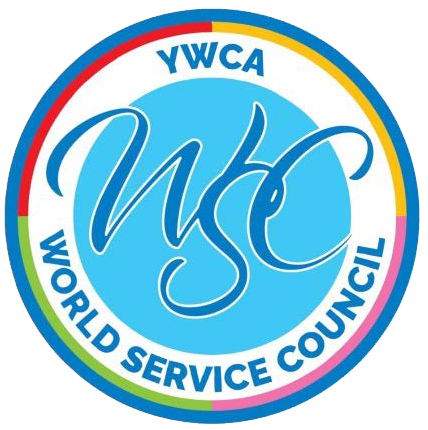More than 65 YWCA leaders from 20+ countries gathered in New York for the UN Commission on the Status of Women hearings March 4-17 to engage in meaningful conversations and advocate for the rights of women, young women and girls. Multiple events by YWCAs of Palestine, Canada, Japan and World YWCA were complementary with the Goal 2035 of the World YWCA movement. Various conversations were hosted by World YWCA with the leaders around the soon-to-happen World YWCA Council later this year. In addition to the presenters, there were YWCA delegates from USA, Ethiopia, Bangladesh, Thailand, Nigeria, Philippines Haiti, Australia, and the World Service Council.

The World YWCA delegation was welcomed to New York by the YWCA USA with a reception headed by CEO Margaret Mitchelll and USA Board Chair Tina Herrara, The event was held at the Alvin Ailey Dance Center and many other local YWCA members attended. World YWCA General Secretary Casey Harden and World Board Chair Mira Rizek headed up the World delegation. Representing World Service Council was Catherine Hickey, Rima and Doris Salah, YWCA Brooklyn CEO Martha Kamber Danika Ali.
Catherine Hickey reported on breakfast event co-sponsored by the World YWCA and Australian government titled Rise Up! This World YWCA initiative is a road map developed by young women from the South Seas/Asian Pacific Region for young women with the intention to contribute to their empowerment in order to reach full leadership potential. Two of the speakers grew up in the YW movement, the third was an outside recruit who had lost her job in the tourism industry. The three young women gave moving narratives of their work. It includes the following key components.
- Develop a deeper understanding of human rights.
- Learn to identify challenges and opportunities to reach your full leadership potential.
- Understand priority issues affecting women, young women, and girls.
- Develop a diversity of advocacy skills.
- Enhance your sense of self-esteem and confidence.
- Develop the ability to influence policy/.
- Learn how to build, facilitate, and practice safe spaces.
- Build increased connection with and support from peers.
Every year Japan brings a lively contingent of young women who give a thoughtful, well researched presentation on contemporary problems facing young women and girls. This year they focused on “Social Media and Sexual Exploitation.”
On International Women’s Day, the World YWCA led a parallel event called “Wholeads?: Young Women Smashing Power Structures by Feminist Consultations.” Another event co-sponsored by the World YWCA was a session on “Perspectives on Empowering Women through Effective Collaboration in Challenging Contexts.”
YWCA Palestine held a powerful panel on “Conflict, SBGV and Technology: Learnings from Young Women in Gaza.” And longtime WSC member and UN Deputy Rima Salah participated in a panel spoke to the importance of civil society involvement in UN policy to affect real change.
Texts on Gender Equality: Empowerment in Digital Age approved at UN CSW 67
Following the lengthy negotiations that continued late into the night, the Commission concluded its 67th session, approving a set of agreed conclusions focused on gender equality and the empowerment of women and girl in the context of innovation, technological change, and education in the digital age.
Sima Sami Bahous, Under-Secretary-General for Gender Equality and the Empowerment of women and Executive Director of the United Nations Entity for Gender Equality and the Empowerment of Women (UN-Women), in closing remarks, said: “This year’s agreed conclusions are game-changing and bring forward our vision of a more equal and connected world for women and girls in all their diversity.” The ultimate success of the agreed conclusions lies in how the international community will collectively take them forward, she said, declaring that: “As we leave here now, let us bring the might of our combined determination to translate them into reality for all women and girls.” The agreed conclusions provide a global framework to enable the development of international norms and standards for digital technology that will encourage the increased participation of women and girls.
Perhaps one of the most significant outcomes was when General Secretary Antonio Guterres emphasized the need to overhaul the patriarchal structures that perpetuate gender inequality, especially in the technology sector. He announced he is committed to do everything in his power to raise $300 million over the next three years for women’s organizations and human rights defenders in crisis situations. He claimed it would not be easy, but we will do everything to make sure that we are able to fundraise properly in this regard.
Topic highlights:
- Speakers underscored the importance of citizen-generated and gender-disaggregated data to tackle inequality, while others offered suggestions on closing gender gaps in care work, technology and geospatial services and nutrition.
- Women and girls from all corners of the earth and of all ages and identities underscored the importance of inclusion, gender equitable assistive technology and gender transformative approaches in achieving gender equality in the digital spheres.
- Strong legislative, policy and institutional frameworks rooted in gender-based data are critical not only to empower women and girls on digital platforms, but ensure those platforms have an intersectional lens that appropriately represent the full range of identities.
- Youth representatives pointed to barriers, both offline and online, that prevent their participating in information and communications technology sectors, and the policies and processes needed to enable such participation.
- Delegates presented on their national efforts to implement the 2018 agreed outcomes to on challenges and opportunities in achieving gender equality and empowerment of rural women and girls.
- Speakers emphasized the importance of increased participation of women and girls in digital technology and innovation, and their engagement as students and professionals in science, technology, engineering and mathematics as crucial to economies around the world, as well as the global transition to sustainability.
- Speakers renewed calls for investments to bridge the gender digital divide, ensure a safe digital environment and ensure the full participation of women and girls in science, technology, engineering, and math.
